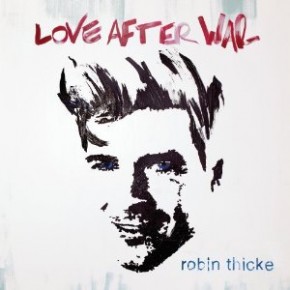 Robin Thicke has to be the most unlikely R&B star of all time. His mom is a former soap star. His dad is Jason Fucking Seaver. Irregardless of his stardom, what’s proven a bit more interesting to me is how someone who seemed to be bringing a quirky, fresh attitude to pop ‘n b turned so conventional over the course of his career. I was what you might call an “early adopter” of Robin. Back in the summer of 2002, I heard “When I Get You Alone” on the radio as I was walking through Central Park, and I was immediately hooked. Before he added his first name back to his stage moniker, when he looked like a dirty hippie, I was there. And each successive album has left an increasingly bad taste in my mouth, culminating in 2009’s Sex Therapy, where gems like the title track were juxtaposed against songs like the atrocious “Shakin’ It For Daddy,” a track so bad it caused me to unnecessarily hate Nicki Minaj for six months. As my man Mark Jackson would say, “Robin Thicke, you’re better than that.”
Robin Thicke has to be the most unlikely R&B star of all time. His mom is a former soap star. His dad is Jason Fucking Seaver. Irregardless of his stardom, what’s proven a bit more interesting to me is how someone who seemed to be bringing a quirky, fresh attitude to pop ‘n b turned so conventional over the course of his career. I was what you might call an “early adopter” of Robin. Back in the summer of 2002, I heard “When I Get You Alone” on the radio as I was walking through Central Park, and I was immediately hooked. Before he added his first name back to his stage moniker, when he looked like a dirty hippie, I was there. And each successive album has left an increasingly bad taste in my mouth, culminating in 2009’s Sex Therapy, where gems like the title track were juxtaposed against songs like the atrocious “Shakin’ It For Daddy,” a track so bad it caused me to unnecessarily hate Nicki Minaj for six months. As my man Mark Jackson would say, “Robin Thicke, you’re better than that.”
Thankfully, someone talked some sense into Robin’s head. Love After War is a return to respectability. Robin stopped sucking on Jimmy Iovine’s teat long enough to realize that his core audience wasn’t trying to hear half-baked (pun intended) collabos with the likes of Kid Cudi. To a lot of folks, he was the new millennium El DeBarge (before folks realized the old El DeBarge was still viable) and fans with far less patience than me were all set to jump ship.
Ship-jumpers, Robin is crawling back with an album contains only one guest emcee (Lil Wayne, who’s fairly unobtrusive and has been a constant presence on Thicke’s albums anyway.) Unfortunately, the deluxe version of Love After War contains twenty tracks. Twenty tracks. I feel like I should be saying it over and over like Allen Iverson said “practice” at that press conference. Twenty songs is too much ANYBODY. For Robin Thicke, it turns what could have been a great album into a simply good one.
Robin’s influences are sound. I know I mentioned El DeBarge before (seriously—someone please have these two sing a duet! They’re labelmates!) and on some of the softer cuts, he not only nails El’s falsetto but goes after that lilting, vaguely Latin sound that El and his siblings went after on 1983’s In A Special Way. Of course, that sound broke Robin through a few years ago with “Lost Without U,” so he’s not wrong to repeat that sound several times on Love After War (most notably on the imaginatively titled “Tears On My Tuxedo”.) Like El, Robin also has a Marvin Gaye fixation, which rears it’s head on the excellent title track-a song that strongly recalls MPG’s “After The Dance” (a song that El covered…are we gonna find out someday that Thicke and El DeBarge are the same person?)
One thing that’s changed since Sex Therapy is that Robin and his wife Paula have become parents, and the newfound sense of family informs several tracks on Love After War. “The New Generation” is an uncharacteristically tough call to arms, likely created as a result of seeing what the future world will look like for his son. More of the songs on the album turn the attention over to his better half, and the end result is sort of like an open love letter for the world to se…uh, listen to. Whether in a jazzy mood (“Cloud 9” finds Robin doing the Nat “King” Cole thing to solid results), piling on the bombast (“Never Give Up” must be heard to be believed) or just plain old sucking up on “I Don’t Know How It Feels To Be U,” it’s obvious that this man loves his lady quite a bit.
A Beautiful World Thicke will never totally be back, but Love After War is at least a welcome return to Evolution-era Robin Thicke. Although the album could probably do with 5 or so less songs, and a few of the songs sound a bit too similar, I’m just glad he made an album good enough that I’m willing to forgive the mediocrity of Sex Therapy. Yep, Robin’s fifth album has me showing him that smile again.
Grade: B

